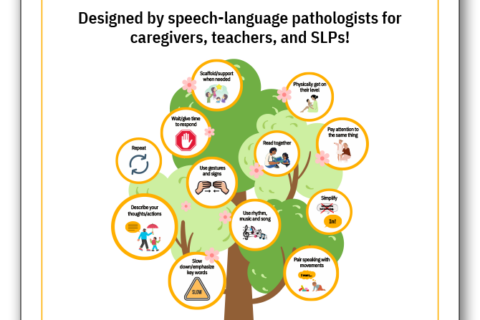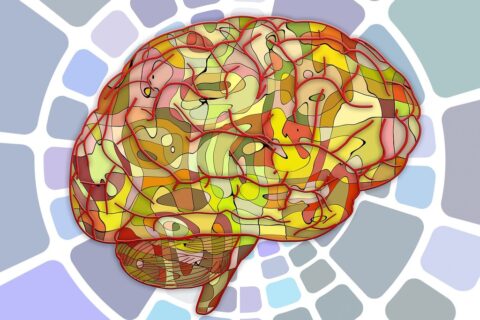Does My Toddler Need Speech Therapy?

Many parents wonder about their children’s speech and language development. It may feel as though your child has a difficult time being understood by unfamiliar people or is saying less than peers or siblings did at their age. You may be unsure whether these differences are typical or if your child’s speech and language are delayed and would benefit from an evaluation by a speech-language pathologist.
Below, find some helpful tips about typical language development in toddlers and when to seek help!
What Is the Difference Between Speech and Language?
First, it is important to distinguish between speech and language. Speech is how we physically produce sounds using the subsystems of respiration (breathing), phonation (voicing), and articulation (using the jaw, teeth, lips, and tongue to make sounds.) Children with speech delays or disorders may make speech sound errors, such as “wabbit” for “rabbit” or “Tootie” for “cookie.”
Language, on the other hand, refers to the words we use, the order in which we put the words to create meaning, and how we use these words to share our thoughts and ideas with others. Children with language delays may not have many words to express their ideas, or they may speak in shorter, simpler sentences that are typical at their developmental age. Children may experience delays in speech, language, or both, though there is a great amount of individual variation in terms of when children master skills.
What Is Considered Normal Speech Development in Children?
When children begin to learn to speak, the motor coordination required for speech is immature. As a result, it is typical children will make “mistakes,” such a simplifying syllables (e.g., “nana” for “banana”) or substituting certain sounds for others that are easier to produce (e.g., “flowing” for “swing”). This process of simplifying and substituting sounds is considered a normal part of typical speech development in the early stages of development.
As children mature and the coordination and control of their speaking system become more sophisticated, these patterns will disappear, and children will acquire typical articulation skills. However, sometimes these patterns of substitution and simplification persist beyond the typical ages of elimination.
Generally, by age 4 children should be able to say the following sounds: /p/, /b/, /m/, /n/, /t/, /d/, /k/, /g/, /f/, /s/, /y/, /h/ and all vowels and vowel combinations. Additionally, by age 3 children should be about 75%-100% intelligible to others, and by the time children start kindergarten, they should be understood by both familiar and unfamiliar listeners almost all of the time!
With regard to attention, listening, and comprehension skills, children aged 2-3 can typically understand and follow two-step directions. For example, at this stage, a child should be able to accurately follow, “Pick up your ball and put it in the box.” Additionally, children of this age demonstrate an understanding of contrasting concepts, such as stop/go and yummy/yucky. By age 3, children have also developed an understanding of simple what, what doing, who, and where questions, and by age 4 the ability to answer wh- questions begin to expand to comprehension of how, why, and when questions.
Between the ages of 1.5-2 years, children begin to use two to three words together, in short phrases, and at this time you will also notice that children begin to use language for more purposes or functions. Children move from an earlier stage of using words to comment, request, and respond to a more advanced stage of using language to ask, engage in pretend play, and regulate another’s actions.
You will also notice children rapidly integrating new words into their vocabulary each day, and many have a word or label for almost everything in their immediate environment by 2-3 years of age. By age 4, children are able to use longer sentences of four or more words to talk about things that happen away from home including friends, school, and interests.
How Do You Know If Your Child Needs Speech Therapy?
If at any point during early childhood development a child is noted to experience an interruption or regression in the progress of their language, they should receive a speech and language evaluation. For example, if a child is speaking using phrases such as “up mama” and “more cracker” and then stops using real, functional words to communicate, it is appropriate to seek the advice of your pediatrician or a speech-language pathologist. Children do not typically lose skills they previously master.
We recognize the healthy development of a child is one of a parent’s greatest concerns. Rest assured your concerns are real and valid. In fact, we find that our diagnostic results are usually in agreement with a parent’s intuitive sense that something in terms of speech and language development may need to be addressed.
A skilled speech-language pathologist will listen to your concerns and provide you with reliable and research-based advice about your child’s specific strengths and challenges. A comprehensive speech and language evaluation can reveal whether your child’s speech and language is developing typically or if he/she could benefit from speech and language intervention or simply a short boost of enrichment to support and strengthen their skills. A speech-language pathologist can guide you through a treatment plan and home practice to address your child’s current difficulties.
Children’s Speech Services at Open Lines®
If you’re concerned about your child’s speech or language development, contact Open Lines® today by phone at 212-430-6800, by email at [email protected], or through our contact form.
If you’re struggling with communication difficulties, it’s time to turn to Open Lines®. Contact us via phone (212-430-6800), email [email protected], or by filling out our convenient contact form. Improve your communication skills and unlock your potential with Open Lines® Speech and Communication in New York today!
References
Bowen, C. (1998). Ages and Stages Summary: Language Development 0-5 years. Retrieved from http://www.speech-language-therapy.com/
Get in Touch With Open Lines®














